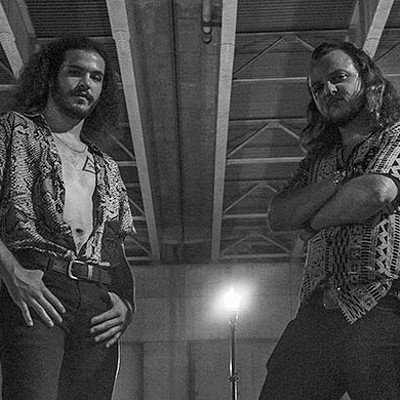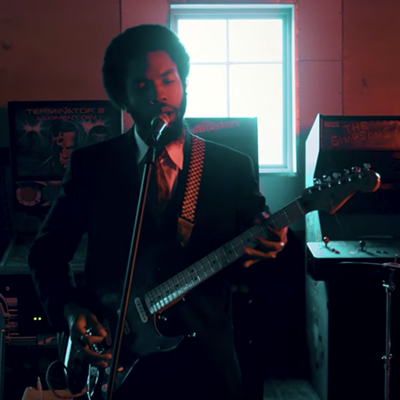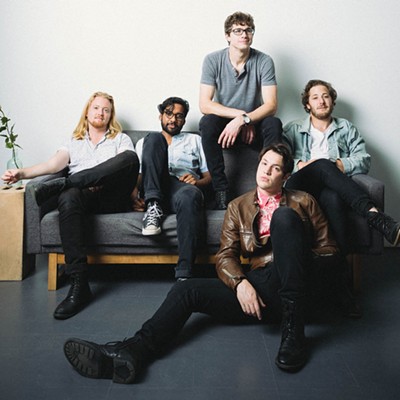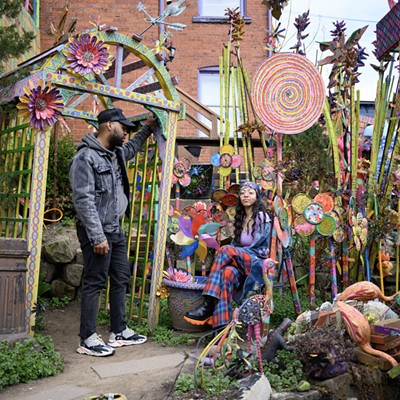Kanye West has generated the buzz of an Oscars-bound picture, deemed so while in pre-production. Like when Tom Hanks tells a reporter he's thinking about taking a role in a movie, and the next day said movie is Best Picture. When West was announced as the newest Roc-A-Fella artist last year, people began declaring his CD a classic before it even had a song recorded. And since The College Dropout dropped in a couple weeks ago, the critics have pretty much unanimously declared it flawless. There are arguments to be made that it is a classic, but maybe not for the reasons so far ascribed.
West and Roc-A-Fella CEO Damon Dash have bragged in recent months that every song on College Dropout could be a single -- as Dash expects for all Roc-A-Fella releases. This is true. Even the preachy, testifyin' "Jesus Walks," which literally begs to be a single in the lyrics, could feasibly chart. But having a full album of potential Billboard Heatseekers doesn't necessarily constitute a classic, especially in hip hop.
If you look at most of rap's classic albums you'll find some or even a lot of the songs on those CDs could not be singles. Everything on Nas' Illmatic wasn't a bona fide hit ("One Time For Your Mind"); most songs on Ghostface Killah's Supreme Clientele were anything but chartable. But not being single-worthy doesn't make a song bad.
Since the aim for College Dropout was to make each song Top 10 material, some of it seems overstretched. Putting the Harlem Boys Choir on "Two Words" with Mos Def and Freeway is just showing off. Their presence on the song doesn't do anything to amplify it creatively and at the end of the song you barely hear them. Violinist Miri Ben-Ari appears on one song too many and again just seems superfluous. Jay-Z, while welcomed back, spits one verse too many on "Never Let Me Down." Common, back to earth after his Electric Circus, seems like a third wheel on "Get 'Em High," which also features Talib Kweli.
Still West sounds like he's earned his spot among the top-tier emcees he hosts. He's at his best and his worst when he makes his personal story plain. On songs like "Through the Wire" and "Never Let Me Down," his accounts of what happened in his near-fatal car accident and how it transformed his life are inspirational: "I can't get mad at what the accident did to my left eye / 'Cause look what an accident did to Left Eye." Lines like that, referring to the TLC member who didn't survive her car wreck, cause the listener to examine life in a way that far too many rappers neglect to do for their fans. But by the closing "Last Call," we get the point and really don't care to hear West's 10-minute monologue on his ashy-to-classy story. In fact, he belabors us with his bask-in-obscurity theme. From the songs to the sleeve art, West rubs it in, and his one-time mentor-producer No I.D. may have issues with West stealing his persona.
West doesn't break ground with this "chipmunk soul" sound, either: sped-up soul samples. Pete Rock and the RZA did that for years, as West acknowledges. What West brings to the table is the voice of the third-generation, college-bred black boojwah, as much as he tries to eschew the collegiate identity. He shouts out Web sites like Black Planet, a haven for black college students, and also Banana Republic and the Gap, the default gear stops for all preppies.
This same month last year, the then-most-anticipated rap album came also from an artist who escaped death to his success story's benefit. But 50 Cent's near-death experience came from -- well, does it really need repeating? But where 50 and his fate nearly met up in the hood over some street shit, West almost met his in a rented luxury car in West Hollywood in front of the ritzy five-star where he was staying.
Harvard scholar Henry Louis Gates often bullhorns how the black middle class claims just as many in numbers now as the black underclass in America. West symbolizes the former, while 50 Cent symbolizes the latter, grossly over-represented in hip hop. What we learn from West is that black America's new entrance into suburbia and the hotels that 40 years ago we would have been barred from won't save us from the inevitable. Further, songs like "All Falls Down" brilliantly confess infatuations with materialism and how new money can't buy happiness.
It's just good there's finally someone from that other black America to tell that story.

















